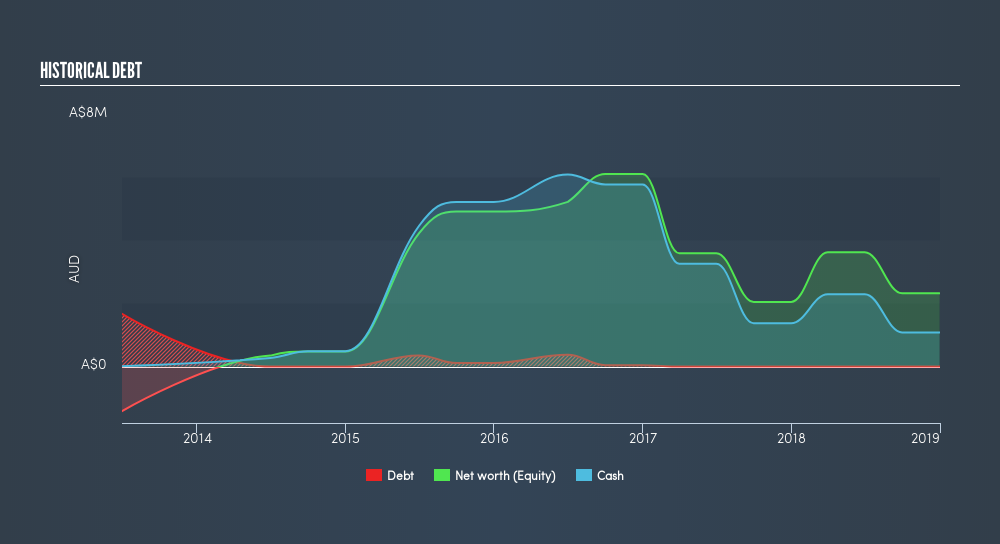Is Rent.com.au (ASX:RNT) Using Debt Sensibly?

Legendary fund manager Li Lu (who Charlie Munger backed) once said, 'The biggest investment risk is not the volatility of prices, but whether you will suffer a permanent loss of capital.' So it seems the smart money knows that debt - which is usually involved in bankruptcies - is a very important factor, when you assess how risky a company is. As with many other companies Rent.com.au Limited (ASX:RNT) makes use of debt. But the real question is whether this debt is making the company risky.
What Risk Does Debt Bring?
Debt and other liabilities become risky for a business when it cannot easily fulfill those obligations, either with free cash flow or by raising capital at an attractive price. Part and parcel of capitalism is the process of 'creative destruction' where failed businesses are mercilessly liquidated by their bankers. However, a more frequent (but still costly) occurrence is where a company must issue shares at bargain-basement prices, permanently diluting shareholders, just to shore up its balance sheet. Of course, debt can be an important tool in businesses, particularly capital heavy businesses. The first thing to do when considering how much debt a business uses is to look at its cash and debt together.
See our latest analysis for Rent.com.au
What Is Rent.com.au's Net Debt?
The image below, which you can click on for greater detail, shows that Rent.com.au had debt of AU$6.3k at the end of December 2018, a reduction from AU$46.2k over a year. But on the other hand it also has AU$1.08m in cash, leading to a AU$1.08m net cash position.

How Strong Is Rent.com.au's Balance Sheet?
Zooming in on the latest balance sheet data, we can see that Rent.com.au had liabilities of AU$664.0k due within 12 months and no liabilities due beyond that. Offsetting this, it had AU$1.08m in cash and AU$320.4k in receivables that were due within 12 months. So it can boast AU$739.2k more liquid assets than total liabilities.
This short term liquidity is a sign that Rent.com.au could probably pay off its debt with ease, as its balance sheet is far from stretched. Simply put, the fact that Rent.com.au has more cash than debt is arguably a good indication that it can manage its debt safely. When analysing debt levels, the balance sheet is the obvious place to start. But you can't view debt in total isolation; since Rent.com.au will need earnings to service that debt. So if you're keen to discover more about its earnings, it might be worth checking out this graph of its long term earnings trend.
Over 12 months, Rent.com.au reported revenue of AU$2.3m, which is a gain of 19%. We usually like to see faster growth from unprofitable companies, but each to their own.
So How Risky Is Rent.com.au?
By their very nature companies that are losing money are more risky than those with a long history of profitability. And the fact is that over the last twelve months Rent.com.au lost money at the earnings before interest and tax (EBIT) line. Indeed, in that time it burnt through AU$2.9m of cash and made a loss of AU$2.5m. With only AU$1.1m on the balance sheet, it would appear that its going to need to raise capital again soon. Even though its balance sheet seems sufficiently liquid, debt always makes us a little nervous if a company doesn't produce free cash flow regularly. For riskier companies like Rent.com.au I always like to keep an eye on whether insiders are buying or selling. So click here if you want to find out for yourself.
When all is said and done, sometimes its easier to focus on companies that don't even need debt. Readers can access a list of growth stocks with zero net debt 100% free, right now.
We aim to bring you long-term focused research analysis driven by fundamental data. Note that our analysis may not factor in the latest price-sensitive company announcements or qualitative material.
If you spot an error that warrants correction, please contact the editor at editorial-team@simplywallst.com. This article by Simply Wall St is general in nature. It does not constitute a recommendation to buy or sell any stock, and does not take account of your objectives, or your financial situation. Simply Wall St has no position in the stocks mentioned. Thank you for reading.
About ASX:RNT
Rent.com.au
Operates a website and technology applications that focuses on rental property market in Australia.
Flawless balance sheet moderate.
Market Insights
Community Narratives



